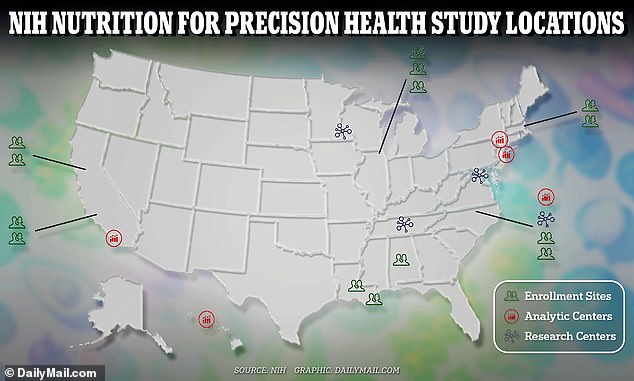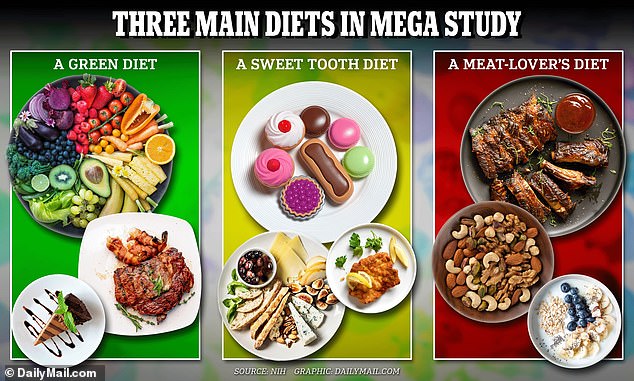Imagine getting paid by the government to take six weeks off work and eat junk food.
That’s the reality for some of the Americans participating in one of the most comprehensive nutrition studies ever conducted.
The nearly $200 million project, led by the National Institutes of Health (NIH), involves 500 participants living in government laboratories across the country and receiving carefully selected diets while undergoing hundreds of medical tests.
The goal is to identify how different people respond to a variety of diets, hopefully providing more personalized nutritional guidance and establishing clearer recommendations for the American public amid a growing obesity epidemic that now means nearly half of Americans are too fat
The NIH research, titled Precision Health Nutrition Study, will involve 10,000 participants in total and hopes to provide individualized dietary advice based on lifestyles, genes, environment, gut microbiome and culture of people, and study how these factors influence a person’s response to a diet.
Study participants will spend two weeks each on three different diets: one rich in fruits and vegetables and low in sugar; one high in sugars and meats and low in fruits and fish; and one rich in vegetables and meats and low in dairy and fruits.

The NPH study uses 14 sites in Alabama, California, Illinois, Louisiana, Massachusetts and North Carolina to conduct the research.
Enrollment for the study opened in April 2023 and will continue with follow-ups for four years.
Among the hundreds of people housed in a scientific facility is Kevin Elizabeth, a 29-year-old tech worker, who, during a study session, was observed eating sugary cereal while hooked up to an IV.
As part of the research, Elizabeth wore a heart rate monitor and a glucose monitor to take measurements while eating breakfast. She also had blood drawn nine times over four hours to measure how her body responded to the food, The Wall Street Journal. reported.
Throughout their stay, the participant will be fed three different diets and will undergo full-body scans to measure fat and muscle and take urine and blood samples.
The Louisiana resident was nearing the end of the study’s processed food diet and said he felt more tired than usual.
While following this diet, he said he “just didn’t feel good” and said he had more energy during the two weeks he followed the study’s vegetable-rich eating plan.
Mr Elizabeth, who works from home and can continue her work remotely while taking part in the study, told the publication: “I thought it would be nice if I could do something meaningful for science and, personally, just to learn more about the diet”. and how it affects me personally.’
The NIH saying: ‘The goal of precision nutrition is to move from a “one size fits all” approach to more specific recommendations that are based on each individual’s unique characteristics and environments.’
Over time, the NIH hopes to create a nutritional database of 1 million people to reflect the diversity of the American population, stimulate more medical research, and provide people with individualized health prevention strategies, treatments, and care options.
In addition to the 500 people living in scientific facilities, some will undergo more intense studies, including monitoring people to ensure they follow the diet and do not eat unauthorized foods.
Others will wear special glasses to record what they eat, The Wall Street Journal reported.
It is well documented that a poor diet can cause a series of health problems and chronic diseases such as high blood pressure, diabetes and obesity.
A September 2023 report from the Centers for Disease Control and Prevention found that obesity rates in the U.S. are increasing, with states having between 25 and 40 percent of their residents classified as obese.
Overall, 42 percent of people ages 20 and older are obese in the United States.
The numbers led CDC experts to declare that addressing the nation’s obesity epidemic is an “urgent priority.”
Contributing to the problem are contradictory and unclear dietary guidelines, as well as increasingly emerging diet culture and dietary advice.
The study’s website states: ‘Nutrition is not one-size-fits-all. Nutrition, or the foods we eat, can help prevent and combat conditions such as high blood pressure, diabetes, stroke, and cancer.
‘But we all live in different environments and come from different cultures. Each of us starts from a different place with our health. And everyone breaks down food differently.
“The Nutrition for Precision Health study investigates how nutrition can be tailored to each person’s genes, culture and environment to improve health.”
The hope of the study, study coordinator Holly Nicastro told the WSJ, is that in several years people will be able to undergo some simple medical tests at their doctor’s office, take a survey about health and lifestyle, and then receive personalized information. . Dietary advice.
The NPH study uses 14 sites in Alabama, California, Illinois, Louisiana, Massachusetts and North Carolina to conduct the research. It will use artificial intelligence-based approaches to analyze information provided by subjects to develop algorithms that will predict responses to certain diet patterns.
Nicastro said in a previous press release: ‘Poor diet is a leading cause of preventable disease and death around the world. If we all followed the healthy eating guidelines available to us now, we still may not achieve optimal health because our bodies respond differently to foods.
“Through this study, we aim to better understand the differences in individual responses and pave the way for more personalized guidelines in the future.”
There are three parts to the NIH study. In the first, all study participants are asked to complete surveys, report their daily diet, and provide urine, blood, and stool samples.
In the second, a subset of people will receive selected diets and in the third component participants will live at the research facility to be studied more closely.
According to the clinical trial of the study. descriptionParticipants will spend two weeks each on three different diets: one rich in fruits, vegetables, whole grains, low in sugar and moderate amounts of dairy, eggs, meat and fish.
The calorie intake ranges between 1,600 and 3,200.
The second diet will consist of high amounts of refined grains, meats, sugars, snacks, desserts and processed foods. It is low in fruits and vegetables, as well as whole grains and fish.
Calories will range between 1,600 and 3,200.
The third diet will have moderate to high consumption levels of vegetables, meats, fats and oils and low amounts of dairy and fruits, as well as very low amounts of grains and sugars.
Calories will also range between 1,600 and 3,200.
NPH participants are chosen from the NIH’s larger research project, All of Us, which hopes to build a nutritional database of one million people.
So far, the agency says the project has 535,000 biological samples from 515,000 fully enrolled participants, and an additional 240,000 potential enrollees are being evaluated for admission to the study.
Throughout the study process, participants will receive $25 for completing short surveys and up to $300 depending on how far along in the process they continue.
Those who undergo more intensive research will receive additional compensation, the NIH said.

